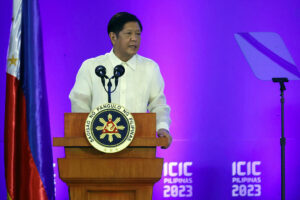By Kenneth Christiane L. Basilio, Reporter
PRESIDENT Ferdinand R. Marcos, Jr. should enact the long-awaited Freedom of Information (FOI) bill to stay true to his government’s commitment to transparency and accountability, and as he seeks to cement his legacy in the second half of his term, political analysts said at the weekend.
The Philippine leader should declare the measure as a priority of his administration to help push the bill forward in Congress, which for decades has remained lukewarm to the proposal, they added.
“If Mr. Marcos is really serious and sincere with his pronouncements about promoting transparency and accountability in the government and combating fake news, he should prioritize and certify as urgent the passage of an FOI law in the 20th Congress,” Arjan P. Aguirre, who teaches political science at the Ateneo de Manila University, said in a Facebook Messenger chat.
The 1987 Constitution upholds the right to access information but needs an enabling law for it to be enforced.
Proposals to establish an FOI regime have been filed as early as 1992 but have repeatedly failed to pass largely due to lack of prioritization by lawmakers.
Certifying the FOI bill as part of the Marcos administration’s legislative priorities would be a “game-changer” for his government as it would send a signal that he’s willing to engage with stakeholders transparently, said Patrick C. Acupan, convener of transparency group FOI Youth Initiative.
An FOI law would also help rebuild public trust in the government, he added.
“The persistent lack of transparency has real, everyday consequences for the people,” Mr. Acupan said. “We are left in the dark about how decisions are made, how public money is spent, and who benefits. This undermines our ability to assert our rights and demand accountability.”
He said that Filipinos are not content with simply knowing what government programs are being funded, as they seek full clarity on how decisions are made, and state resources are allocated.
“It’s one thing to publish an amount allocated for social amelioration. But that alone won’t tell us who received the funds, how they were selected, who were excluded and why, how the list of beneficiaries is validated,” he said.
Any FOI measures should clearly define the scope of accessible government data and specify exceptions, Mr. Acupan said, citing a proposal by transparency advocacy group Right to Know, Right Now Coalition.
There should also be an independent government body to oversee FOI requests and operations, helping insulate it from political interference, he added.
Mr. Aguirre, meanwhile, said an FOI law should be accompanied by other measures that could strengthen the country’s democratic institutions, as he urged for action on an anti-political dynasty bill and proposals that could help reform the party-list system.
Lawmakers should also look at streamlining and strengthening government institutions handling graft and corruption accusations to further boost public trust in the state, Anthony Lawrence A. Borja, an associate political science professor at the De La Salle University said.
“This is to ensure that heads would roll in the near future because in the absence of well-publicized manifestations of justice, institutions would remain empty in the eyes of those who distrust them,” he said in a Facebook chat.
Mr. Aguirre said that the government too should institutionalize a “Truth Commission” that would oversee the investigation into ex-President Rodrigo R. Duterte’s anti-drug campaign to help further build public trust in the government.
The tough-talking former Philippine president was arrested in Manila in March and was flown to The Hague under an arrest warrant issued by the International Criminal Court, where he now remains in custody. He is facing crimes against humanity charges before the tribunal over his administration’s deadly war on drugs, which human rights groups estimate claimed tens of thousands of lives.
